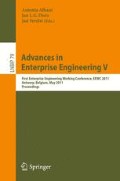Abstract
In this paper we apply the Design and Engineering Methodology for Organizations (DEMO), to specify an ontological model for the generic Control Organization that we argue that exists in every organization. With our proposal, DEMO is extended so that we can specify critical properties of an organization – that we call measures – whose value must respect certain restrictions imposed by other properties of the organization – that we call viability norms. We can now also precisely specify defined resilience strategies that control and eliminate dysfunctions – violations of viability norms caused byexceptions. On top of this, we can also keep a systematic trace of the history of dysfunctions of an organization and of control acts executed to eliminate them. All of these facts are structured in a systematic manner and provided in a set of proposed tables, which are useful for a variety of purposes like (1) making control responsibilities clear and making organization agents accountable for bad control decisions, as well as (2) allowing more informed organization change decisions.
Access this chapter
Tax calculation will be finalised at checkout
Purchases are for personal use only
Preview
Unable to display preview. Download preview PDF.
References
Christensen, W.D., Bickhard, M.H.: The process dynamics of normative function. The Monist. 85, 3–29 (2002)
Dietz, J.L.G.: Enterprise ontology: theory and methodology. Springer, New York (2006)
Holland, J.H.: Hidden order: how adaptation builds complexity. Basic Books, New York (1996)
Bickhard, M.H.: Error dynamics: the dynamic emergence of error avoidance and error vicariants. Journal of Experimental & Theoretical Artificial Intelligence 13, 199–209 (2001)
Brown, S.L., Eisenhardt, K.M.: Competing on the edge: strategy as structured chaos. Harvard Business School Press, Boston (1998)
Saastamoinen, H., White, G.M.: On handling exceptions. In: Proceedings of Conference on Organizational Computing Systems, pp. 302–310. ACM, New York (1995)
Mourão, H.: Supporting effective unexpected exceptions handling in workflow management systems within organizational contexts. Science Faculty of Lisbon University (2007)
Casati, F., Pozzi, G.: Modeling exceptional behaviors in commercial workflow management systems. In: Proceedings of the Fourth CoopIS - International Conference on Cooperative Information Systems, pp. 127–138. IEEE Computer Society, Washington, DC, USA (1999)
Axelrod, R., Cohen, M.D.: Harnessing complexity: organizational implications of a scientific frontier. Basic Books, New York (2001)
Magalhães, R., Silva, A.R.: Organizational design and engineering (ode) - ode white paper - version 1 (2009)
Dietz, J.L.G., Albani, A.: Basic notions regarding business processes and supporting information systems. Requirements Engineering 10, 175–183 (2005)
Op’ t Land, M.: Applying architecture and ontology to the splitting and allying of enterprises. TU Delft (2008)
Dietz, J.L.G.: A world ontology specification language. In: Chung, S., Herrero, P. (eds.) OTM-WS 2005. LNCS, vol. 3762, pp. 688–699. Springer, Heidelberg (2005)
Halpin, T.: Object role modeling: an overview. white paper (1998), http://www.orm.net
Hevner, A.R., March, S.T., Park, J., Ram, S.: Design science in information systems research. MIS Quarterly 28, 75–106 (2004)
Beer, S.: Brain of the firm: a development in management cybernetics. Herder and Herder (1972)
Maturana, H.R., Varela, F.J.: Autopoiesis and cognition: the realization of the living. D. Reidel Pub. Co (1980)
Dietz, J.: Is it φτ ψ or bullshit? - farewell speech. Faculty of Electrical Engineering, Mathematics and Computer Science. Technical University of Delft (2009)
Author information
Authors and Affiliations
Editor information
Editors and Affiliations
Rights and permissions
Copyright information
© 2011 Springer-Verlag Berlin Heidelberg
About this paper
Cite this paper
Aveiro, D., Silva, A.R., Tribolet, J. (2011). Control Organization: A DEMO Based Specification and Extension. In: Albani, A., Dietz, J.L.G., Verelst, J. (eds) Advances in Enterprise Engineering V. EEWC 2011. Lecture Notes in Business Information Processing, vol 79. Springer, Berlin, Heidelberg. https://doi.org/10.1007/978-3-642-21058-7_2
Download citation
DOI: https://doi.org/10.1007/978-3-642-21058-7_2
Publisher Name: Springer, Berlin, Heidelberg
Print ISBN: 978-3-642-21057-0
Online ISBN: 978-3-642-21058-7
eBook Packages: Computer ScienceComputer Science (R0)

